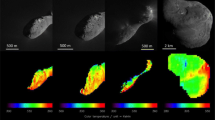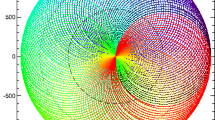Abstract
The thermal emission of the lunar surface has been mapped by an infrared scanner from lunar orbit. Samples from approximately 2.5 × 105 scans reveal the full range of lunar temperatures from 80 K to 400 K. The temperature resolution was 1 K with about ± 2 K absolute precision. Spatial resolution was approximately 2 km over most of the horizon-to-horizon scan. The total mapped area amounted to approximately 30% of the lunar surface.
The data currently available confirms the large population of nighttime thermal anomalies in western Oceanus Procellarum predicted by Earthbased observations. Most of these ‘hot spots’ are associated with fresh impact features or boulder fields. Also seen in the data are ‘cold spots’ where
Article PDF
Similar content being viewed by others
References
Krotikov, V. D. and Shchuko, O. B.: 1963,Soviet. Astron. AJ 7, 228.
Low, F. J.: 1965,Astrophys. J. 142, 806.
McIntosh, R. B., Jr. and Mendell, W. W.: 1972,Proceedings of the Technical Program of the Fourth Annual Electro-Optical Systems Design Conference, Industrial and Scientific Conference Management, Inc., Chicago, pp. 356–361.
Mendell, W. W. and Low, F. J.: 1970,J. Geophys. Res. 75, 3319.
Mendell, W. W.: 1971, ‘Lunar Differential Flux Scans at 22 Microns’, Master's Thesis, Rice University.
Pettit, Edison and Nicholson, Seth B.: 1930,Astrophys. J. 71, 102.
Saari, J. M. and Shorthill, R. W.: 1965,Nature 205, 964.
Author information
Authors and Affiliations
Rights and permissions
About this article
Cite this article
Mendell, W.W., Low, F.J. Preliminary results of the Apollo 17 infrared scanning radiometer. The Moon 9, 97–103 (1974). https://doi.org/10.1007/BF00565396
Received:
Issue Date:
DOI: https://doi.org/10.1007/BF00565396




